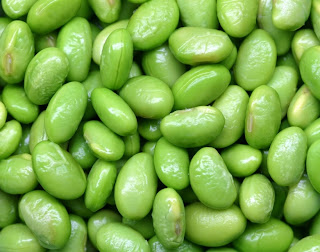In a previous post, we explored the question on whether or not patients with thyroid problems should avoid wheat. Today, we're going to explore the question of whether soy can cause or worsen thyroid problems.
I'll post my opinion towards the end, but as always, I'd like to share what's available in terms of studies or the scientific literature first.
- From a basic science perspective, it seems that there are phytoestrogens in soy, such as genistein, that have been shown to inhibit the enzyme that manufactures thryoid hormones (thyroid peroxidase) in our thyroid glands.
- Some studies have now shown that ingesting soy proteins (this means soy protein isolates which are frequently found in protein powders as well as many, many brands of proteins bars), can decrease the absorption of thyroid hormone medication from our digestive tracts. Simply put, soy protein intake can affect the absorption of thyroid medications such as Synthroid, Levothyroxine, T4 or similar.
- It is still unclear if soy can overtly cause hypothyroidism. One meta-analysis from 2006 which looked at 14 studies, said that there is currently little evidence to show that soy can indeed cause hypothyroidism. The study did note several studies which show decreased absorption of thyroid medication if they are taken with soy protein.
 |
| Beware of hidden sources of soy in our diet such as food bars protein drinks, protein shakes or frozen meals which use large quantities of soy protein isolate. |
several interesting facets of soy:
- In this study, they looked at people taking "typical" amounts of soy in a Western diet vs. those taking higher levels of soy such as in a vegetarian diet. This small study showed that those taking higher levels of soy had a 3-times higher probability of developing hypothyroidism.
- HOWEVER, when subjects ate more soy reflective of a vegetarian diet, they also tended to have significantly lower blood pressure, and lower markers for inflammation in their body.
Bottomline: I think there seems to be enough evidence to say that someone who has thyroid concerns may want to be more careful about how much soy they have in their diet. It does not mean that they have to eliminate soy completely or be super vigilant about it so that it starts to cause stress and anxiety about this food. Rather, it may mean reconsidering how much soy they have in their diet--if you have thyroid issues and have soy as a major food group in your diet--you may want to consider broadening your diet and expanding to other sources of protein or nutrition. I
f you eat soy in whole foods form (like edamame or tofu) and eat it a few times a week, then maybe it is not such a big deal and there's not much sense in stressing too much about this. Once again, observe how you feel when you eat soy or perhaps eliminate soy completely for a month or so and then reintroduce it again in your diet to see how you feel with and without soy to make a conclusion that is true for you. I have discussed this question and have presented the same studies to many patients and their conclusion, after doing an elimination-challenge diet, is that soy has nothing to do with their thyroid problems. However, I also have a handful of patients for whom eliminating soy has been life changing for them. The most dramatic is one patient (in the last six years) whose visible goiter significantly decreased in size when she eliminated soy and then re-appeared when she reintroduced soy into her diet.

No comments:
Post a Comment